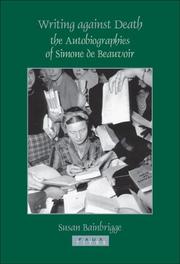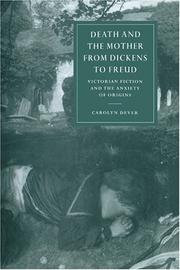| Listing 1 - 3 of 3 |
Sort by
|
Book
ISBN: 2859394346 2757426230 9782859394349 Year: 2020 Publisher: Villeneuve d'Ascq : Presses universitaires du Septentrion,
Abstract | Keywords | Export | Availability | Bookmark
 Loading...
Loading...Choose an application
- Reference Manager
- EndNote
- RefWorks (Direct export to RefWorks)
Je résumerai ce que j’ai proposé dans ce livre, et qui est en réalité fort simple. Nécros (Antiquité), faux mort ou fausse morte (Moyen Âge), mort imparfaite (Encyclopédie), mort clinique ou mort relative maintenant, montrent deux choses. La première c’est qu’on peut se tromper sur les apparences de la mort. La deuxième c’est que ce mort apparent est vivant et non pas mort, car il n’y a pas de vie du mort au sens empirique du terme, quoique la mort puisse être ou n’être pas au sens métaphysique. Or, ce qui complique et obscurcit tout, est la confusion ancestrale de ces survies sous l’apparence de mort, de cette manière de quatrième état de vie (une anesthésie naturelle en quelque sorte) avec une vie du mort, c’est-à-dire cette idée qu’il y a un « état de mort » comme il y a un état de vie (ou plutôt trois états de vie : veille, rêve et sommeil profond). Et que cet état de mort, que les Grecs désignaient par nécros, les superstitions médiévales par fantôme, revenant, est intermédiaire entre la vie et la négation complète et totale de la vie qu’est thanatos pour les Grecs ou, pour les chrétiens et les religions en général, la résurrection ou vie future. J’ai tenté de voir ce qu’il y de positif dans des analyses dont l’apparence est négative, idéologiquement fausse et irrationnelle.
Bereavement in literature --- Death --- Death [Apparent ] --- Death in literature --- Death studies --- Death--Study and teaching --- Dood --- Dood in de literatuur --- Dood--Studie en onderwijs --- Mort --- Mort apparente --- Mort dans la littérature --- Mort--Etude et enseignement --- Schijndood --- Sterfte in de literatuur --- Tanatologie --- Thanatologie --- Thanatology --- Mort. --- Vie future. --- Immortalite. --- Mort dans la littérature. --- Aspect religieux --- History --- Religious aspects --- Greek drama (Tragedy) --- History and criticism --- Mort - Aspect religieux - Etudes comparatives. --- Philosophy --- métaphysique --- philosophie --- mort --- nécros --- Vie future --- Immortalité

ISBN: 9042018453 9401202249 1417591129 9781417591121 9789401202244 9789042018457 Year: 2005 Volume: 262 Publisher: Amsterdam Rodopi
Abstract | Keywords | Export | Availability | Bookmark
 Loading...
Loading...Choose an application
- Reference Manager
- EndNote
- RefWorks (Direct export to RefWorks)
Much has been written on Simone de Beauvoir, one of France's leading intellectual figures of the 20th century. The sheer volume of her autobiographical writings testifies to her indefatigable questioning of the nature of existence and her personal and public engagement in the world over the best part of a century. This study aims to re-evaluate her extensive autobiographical œuvre, exploring its place in relation to the French autobiographical canon, and in the light of recent theorisations of autobiography. It presents readings which engage critically with existentialism, feminist theory, and autobiography studies generally, in particular focusing on the question of 'autothanatography', a term developed by theorists such as Jacques Derrida and Louis Marin. A new reading of the autobiographies via the lens of thanatos is presented with questions of gender in mind, and the nature of autobiography as genre is also explored more fully with particular attention paid to narrative voice. Close readings of the autobiographical œuvre combine with contextual details, critical overviews and links to recent developments in critiques of Beauvoir's fiction and philosophy. The study would be of particular interest to scholars in the following areas: 20th century French literature and culture; Autobiography studies; Literary theory; existentialism; Women's studies.
Beauvoir, Simone de, --- Criticism and interpretation --- Autobiografie --- Autobiographie --- Autobiography --- Bereavement in literature --- Death in literature --- Dood in de literatuur --- Mort dans la littérature --- Sterfte in de literatuur --- Beauvoir, de, Simone --- Beauvoir, Simone de --- Authors [French ] --- 20th century --- Biography --- Beauvoir, Simone de, - 1908-1986 - Criticism and interpretation --- Authors, French --- Autobiography. --- Death in literature. --- Autobiographies --- Egodocuments --- Memoirs --- Biography as a literary form --- History and criticism --- Technique --- Beauvoir, Simone de, - 1908-1986 --- Criticism and interpretation.

ISBN: 0521622808 0521032555 0511585306 0511003617 9780511003615 9780511585302 9780521622806 9780521032551 Year: 2006 Volume: 17 Publisher: Cambridge : Cambridge University Press,
Abstract | Keywords | Export | Availability | Bookmark
 Loading...
Loading...Choose an application
- Reference Manager
- EndNote
- RefWorks (Direct export to RefWorks)
The cultural ideal of motherhood in Victorian Britain seems to be undermined by Victorian novels, which almost always represent mothers as incapacitated, abandoning or dead. Carolyn Dever argues that the phenomenon of the dead or missing mother in Victorian narrative is central to the construction of the good mother as a cultural ideal. Maternal loss is the prerequisite for Victorian representations of domestic life, a fact which has especially complex implications for women. When Freud constructs psychoanalytical models of family, gender and desire, he too assumes that domesticity begins with the death of the mother. Analysing texts by Dickens, Collins, Eliot, Darwin and Woolf, as well as Freud, Klein and Winnicott, Dever argues that fictional and theoretical narratives alike use maternal absence to articulate concerns about gender and representation. Psychoanalysis has long been used to analyse Victorian fiction; Dever contends that Victorian fiction has much to teach us about psychoanalysis.
Bereavement in literature --- Carence maternelle dans la littérature --- Death in literature --- Dood in de literatuur --- Maternal deprivation in literature --- Maternité dans la littérature --- Moeders in de literatuur --- Moederschap in de literatuur --- Mort dans la littérature --- Motherhood in literature --- Mothers in literature --- Mères dans littérature --- Rôle selon le sexe dans la littérature --- Seksuele rolpatronen in de literatuur --- Sex role in literature --- Sterfte in de literatuur --- Tekort aan moederliefde in de literatuur --- English fiction --- -Maternal deprivation in literature --- Psychological fiction, English --- -Sex role in literature --- Literature and society --- -Psychoanalysis and literature --- -Women and literature --- -Literature --- Literature and psychoanalysis --- Psychoanalytic literary criticism --- Literature --- Literature and sociology --- Society and literature --- Sociology and literature --- Sociolinguistics --- English psychological fiction --- English literature --- History and criticism --- History --- -Bibliography --- Social aspects --- -Literature and psychoanalysis --- Psychoanalysis and literature --- Women and literature --- 19th century --- Great Britain --- Psychological fiction [English ] --- Psychoanalysis and literature - Great Britain - History - 19th century. --- Maternal deprivation in literature. --- Arts and Humanities --- Mothers in literature. --- Motherhood in literature. --- Bereavement in literature. --- Gender identity --- Sex role in literature. --- Death in literature. --- Psychoanalysis and literature. --- History. --- Collins, Wilkie, --- Dickens, Charles, --- Eliot, George, --- Woolf, Virginia, --- History and criticism.
| Listing 1 - 3 of 3 |
Sort by
|

 Search
Search Feedback
Feedback About UniCat
About UniCat  Help
Help News
News